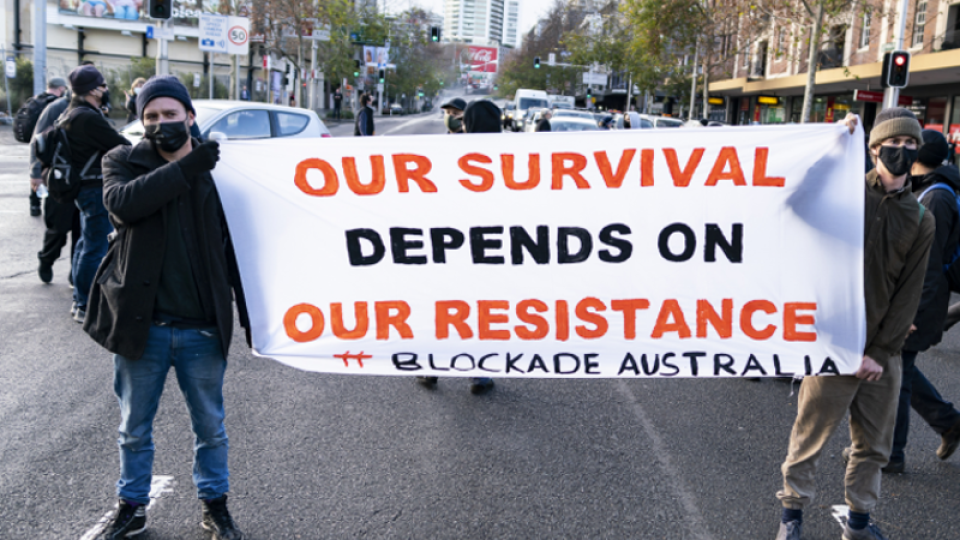Jail climate criminals, not peaceful protesters

Progressive people need to push back against the draconian police reppression of peaceful climate activists in Sydney.
New South Wales is flood-ravaged — again. Sydney received 773 millimetres of rainfall between July 1–4 — more than half the city’s annual average — and rain is set to continue.
The recent flooding affected about 50,000 people and one person lost their life. Power outages were widespread. River Road in Sussex Inlet has flooded four times since 2020. Parts of Windsor flooded for the third time this year.
These floods — along with fires, heat waves and other extreme weather events — are a symptom of global warming.
We need to limit warming to 1.5°C to have a reasonable chance of stopping a runaway climate catastrophe. This requires “immediate and deep emissions reductions across all sectors”, according to the Intergovernmental Panel on Climate Change.
This means confronting the fossil fuel corporations that are responsible for emissions and the capitalist governments that support them.
Blockade Australia (BA) is one of the groups attempting to do exactly that. However, its June 27 to July 2 week of action was met with draconian police repression.
Police raided a BA camp a week before the action, arresting seven people. Activists Max Curmi and Tim Neville have been in Silverwater jail since.
Police then arrested 11 activists on June 27, the first day of BA’s week of action. On day two, about 10 more activists were arrested.
Day three was declared a rest day, however one person was arrested while eating in a park. An Extinction Rebellion drummer was put into a police cell for 34 hours.
Harsh, new anti-protest laws in NSW threaten protesters with up to two years imprisonment or a $22,000 fine.
Restrictive bail conditions were slapped on arrestees: they were issued with non-association orders, originally designed for criminal gangs, that prohibit their interaction with other BA activists. They were refused entry to Sydney’s CBD until their court appearances, set for a month later. One activist was even given a non-association list that included himself.
By contrast, someone who drove a car through the protesters only received a $469 fine and lost three demerit points.
Police targeted other climate groups, including Fireproof Australia (FA), which took action in early April. Jay Larbalestier, who glued himself onto the Sydney Harbour Bridge in April, was fined $7196. He also faces an eight-month Intensive Community Order — the maximum penalty short of jail time, which he narrowly avoided due to a health condition. Prior to sentencing, Larbalestier spent four days in custody and 42 days under house arrest.
Other FA activists were given heavy penalties. Violet Coco spent 21 days under house arrest and remains under a 3pm–10am curfew. Andrew George spent 14 days in a maximum-security prison for interrupting an NRL match before his sentence was overturned by a higher court.
BA member Sergio Herbert was jailed for one year, but has been released while an appeal is underway.
Authorities are trying to justify these draconian measures as a necessary response to activists’ civil disobedience and disruptive tactics.
Governments prefer to criminalise protesters than to tackle the climate crisis. Even the federal Labor government — that sought to create the impression it was serious about climate change — is showing its preparedness to help fossil fuel corporations.
State and federal Labor governments are supporting the massive Scarborough, Beetaloo and Narrabri gas developments. Each of these, by themselves, is incompatible with the emission reductions we need for a safe climate.
The force of the police crackdown shows the lengths to which the government will go to defend the fossil fuel industry.
Activists have begun a necessary discussion about the tactics that most suit the movements’ strategic goals. NSW’s harsh penalties against BA and FA are part of the state’s push to criminalise climate and environment activism. Victoria, Tasmania and Queensland have also recently passed draconian anti-protest laws.
It is easier for authorities to crack down on small groups of people, but that doesn’t mean the disruption tactic in combination with mass actions with clear demands directed against corporate targets is wrong.
The state is intent on criminalising all climate and environment activism in the hope that some will be dissuaded not to take direct action: it has the entire climate movement in its sights.
That puts the onus on all parts of the environment movement to defend the right to protest, to better coordinate our protest actions and build a stronger and more diverse climate movement. Only people power can save the planet.
[Rachel Evans is a member of the Socialist Alliance national executive and participated in the BA week of action.]